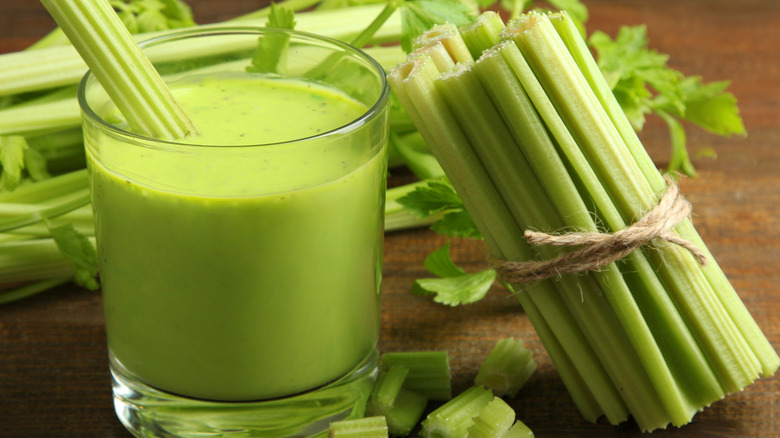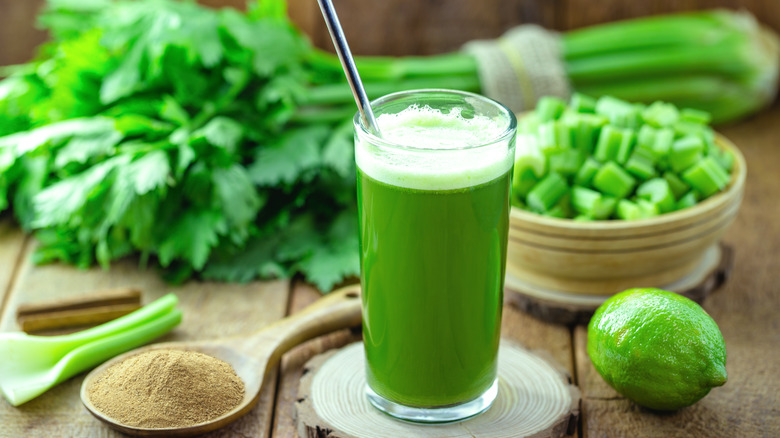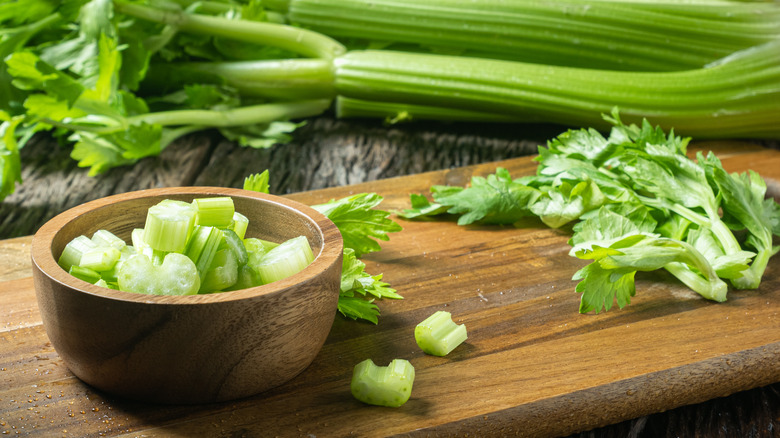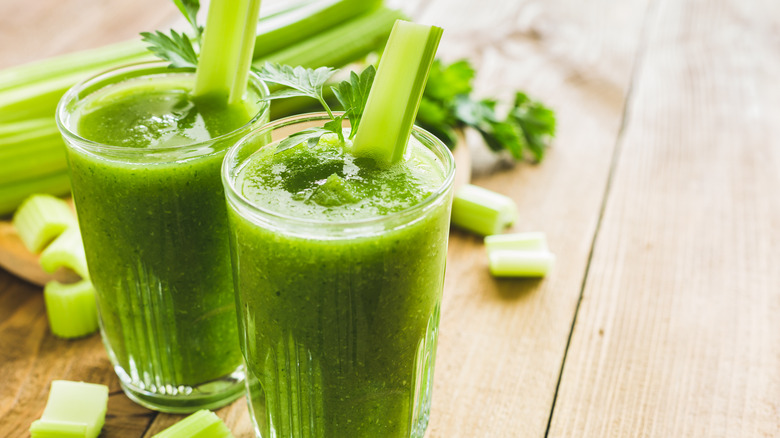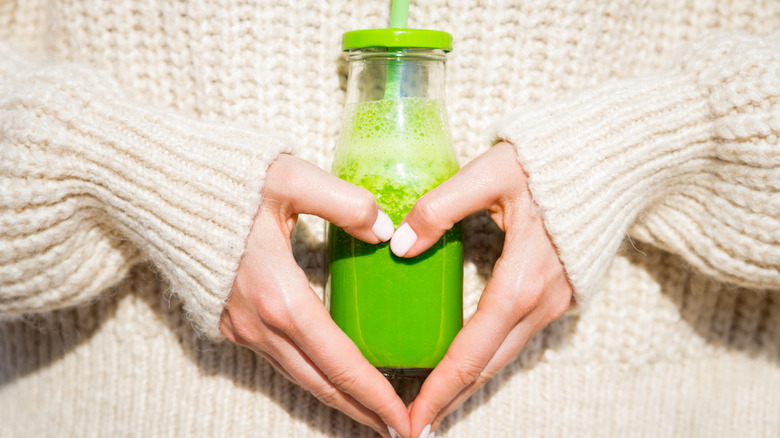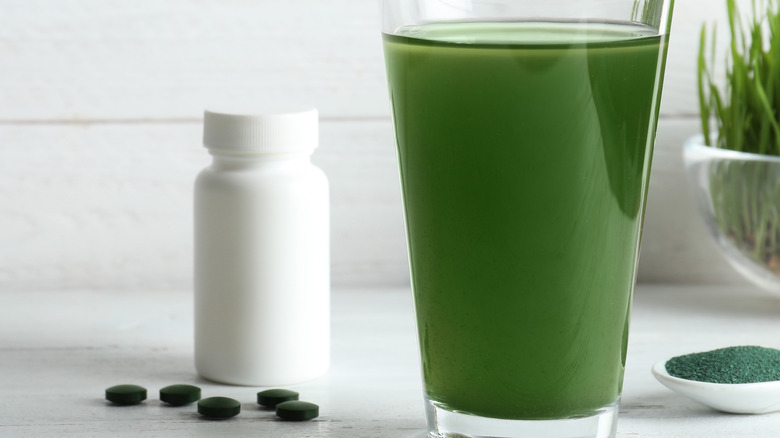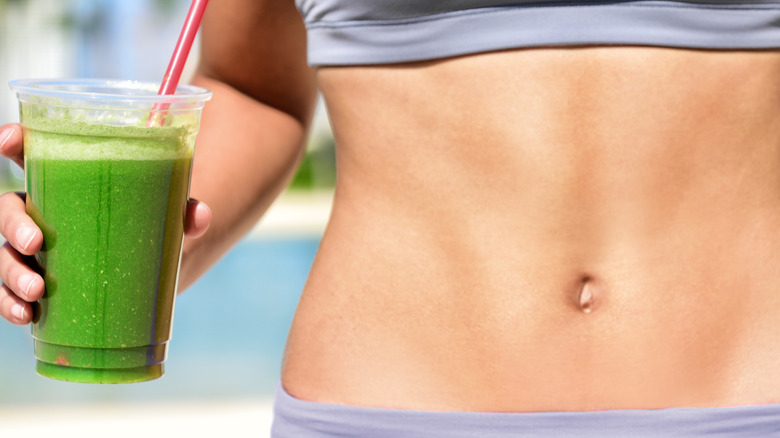What Happens To Your Body When You Drink Celery Juice
Celery is a popular go-to snack for dieters, and can usually be found on every veggie tray alongside the dip. And while it doesn't have the most exciting flavor, ingesting it in juice form has also gained popularity with health-conscious consumers. Many say that celery juice has been all the rage since influencer Anthony William began touting the health benefits of drinking the juice (per The New York Times). "If people knew all the potent healing properties of celery juice that I've observed, it would be widely hailed as a miraculous superfood," exclaimed the so-called "medical medium" in a piece he wrote for Goop.
Celery juice — made by blending and straining celery — is packed with vitamins and minerals, including vitamin A, C, and K, as well as calcium, magnesium, and zinc, to name a few. An eight-ounce glass contains approximately 42.5 calories, 4 grams of fiber, and 2 grams of protein (per WebMD). It's also been known to reduce inflammation, aid in weight loss, and lower your chances of developing certain diseases, says Everyday Health.
But what happens when you drink celery juice every day? Let's see if this popular trend actually lives up to the hype.
You'll stay hydrated
You've probably heard or been told at some point in your life that it's important to stay hydrated, because when you become dehydrated, your body may not function properly. According to Harvard Health Publishing, you should be drinking about four to six cups of water per day.
Of course, water isn't your only option for hydration. As the website states, "All beverages containing water contribute toward your daily needs." So if you're drinking celery juice – which the USDA says is about 95% water — on the regular, then you're staying hydrated.
If that didn't convince you, then maybe a quote from a nutritionist will. As Nucific's head of nutrition Dr. Amy Lee told Well+Good, "Celery mostly consists of water, meaning drinking celery juice can help you reach your daily hydration goal and prevent dehydration." If you find that you're not drinking enough water throughout the day but are consistently drinking celery juice, don't fret — all that celery juice is certainly contributing to your overall daily fluid intake.
You may have more energy
If you're like most people, you probably rely on coffee to wake you up in the morning. The downside of coffee is that the caffeine can make some people jittery or even raise some people's blood pressure temporarily (per Mayo Clinic).
If you're looking for a more health-conscious way to boost your energy without the calories and added sugar in the morning, drinking a cup of celery juice may be your best bet (via Healthline). For starters, celery contains many vital nutrients. Per Healthline, it contains calcium, potassium, and over 12 antioxidants, vitamin C, and beta-carotene (which, according to Medical News Today, is an essential nutrient that is converted to vitamin A). It also has a low glycemic index, which means it won't affect your blood sugar in the same way caffeine would. "People who drink low-sugar, cold-pressed green juice of any kind on a regular basis usually notice benefits such as higher energy levels, better skin, and better mood," says nutritionist Serena Poon to The Thirty.
The next time you reach for a cup of coffee in the morning to get an energy boost, you may want to consider going for a cup of celery juice instead.
You will get a lot of nutrients
Celery is filled with nutrients. Nutritionist Dr. Amy Lee told Well+Good that celery is packed with many essential nutrients — and by regularly drinking celery juice, you're getting vital nutrients that you normally wouldn't get through your regular diet.
There are six essential nutrients that your body needs to maintain optimal health. According to Medical News Today, they are carbohydrates, fats, protein, vitamins, minerals, and water. While your body may not be able to produce everything it needs to function properly, you can obtain these six nutrients through dietary sources.
Celery juice may not give you all the nutrients you need, but it can give you some. The essential nutrients you're getting from drinking celery juice are calcium, folate, magnesium, phosphorus, potassium, sodium, and vitamins A, C, and K, as well as electrolytes and water (via Healthline). If you don't mind the taste of celery juice, then it can be an effective way to get all that healthy stuff that your body needs.
It can boost your immune system
If you drink celery juice every day, it may give your immune system a boost. Celery juice has 14 mg of vitamin C, which is about 19% of the recommended intake if you follow a 2,000 calorie per day diet, notes Verywell Fit. Vitamin C also contributes to immune defense, says a 2017 review in the journal Nutrients. It does this by supporting several cellular functions of both the innate (the immunity you were born with) and the adaptive (developed through outside exposure to a pathogen) immune system.
A 2017 study in the Central-European Journal of Immunology found that luteolin (which is in celery juice) may reduce inflammation and allergic responses in the body. Meanwhile, a 2015 study in the Journal of Cellular and Molecular Medicine found that apigenin (also in celery juice) may suppress the immune system, particularly autoimmune diseases like lupus and asthma. Therefore, drinking celery juice can help reduce inflammation in the body, and may even protect your body from autoimmune diseases.
You will not get much fiber
Celery is full of nutrients, as well as fiber. Fiber is what makes you feel full, and it benefits your gut health. However, when you juice celery, you're essentially leaving out all of the fiber. Registered dietitian Emma Rueth told LiveWell that when you juice vegetables instead of eating them whole, you are removing the fiber content from them.
JJ Virgin, celebrity nutrition and fitness expert, also thinks you'll miss out on the health benefits of fiber from juicing celery. She told Healthline that removing fiber "can trigger a more rapid blood sugar response," among other things. "Not to mention that you'll be missing out on all the other health benefits of fiber," explained Virgin. She added, "Many foods contain nutrients in the peel, pulp, and other components that are lost when they're converted to juice form."
Kristin Kirkpatrick, a registered dietitian, wrote a piece on this trendy detox drink for the Cleveland Clinic and explained that when juice is extracted from celery, it's stripping away the fiber and making everything else more concentrated.
You may go to the bathroom a lot
If you drink celery juice every day, it has the potential to make you go to the bathroom more than you may be used to.
"Daily consumption of celery juice helps balance the bowel flora and aids in smooth bowel movement," says MedicineNet. Celery is high in mannitol, which is a type of sugar alcohol found in vegetables. Mannitol works as an osmotic agent, which means it can loosen your stool, resulting in side effects like diarrhea (per Healthline). For some people, this side effect may lessen over time, but for those with IBS (irritable bowel syndrome), it may be prolonged. If you have IBS or you're just trying to improve your gut health, juicing celery won't help because you're taking out the fiber (via LiveWell).
On the other hand, if you're dealing with constipation, celery juice may become your new best friend. As wellness expert Jennifer Cohen explained in an article for Forbes: "If you have digestive issues, constipation, bloating or any sort of stomach issue, adding celery juice to your diet can potentially reverse these problems." She said that this was because the hydrochloric acid found in celery can help to heal your gut.
Your blood pressure may go down
Having high blood pressure is not rare if you live in the United States. According to the American Heart Association, an estimated 103 million adults struggle with high blood pressure, which is nearly half of all adults living in America. If you have high blood pressure, you're at risk for heart attacks and stroke. As the AHA states: "According to the statistics, only about one in five Americans gets enough exercise and poor eating habits contributed to 45 percent of U.S. deaths in 2012 from heart disease, stroke, and Type 2 diabetes."
Luckily, drinking celery juice may help you in this area. A 2021 study published in the Journal of Chiropractic Medicine focused on a single subject, and found that drinking celery juice every day can help lower blood pressure. A 74-year-old man with a history of hypertension took different medications for his condition, but didn't like the side effects. Before the study, the participant's blood pressure was measured at 150/80 mmHg. For six months, the participant drank celery juice daily. At the end of the six-month period, his blood pressure was at 118/82 mmHg. While celery juice may not be a quick fix for hypertension, it can be a beneficial vegetable drink if you drink it daily.
It can help reduce inflammation
When you hear the word "inflammation" with regard to your body, you're probably thinking of something swollen. Inflammation is part of your body's immune response. When your body's fighting something like an infection or an injury, it can result in swelling or pain (via Everyday Health). When this happens, some people choose to go on an anti-inflammatory diet to help minimize the inflammation.
Celery contains phytonutrients, which may have anti-inflammatory properties that can help fight inflammation in your body, says Live Science. As Illinois-based registered dietitian Christine Palumbo told Everyday Health, "Celery may help to reduce inflammation, but it's not a magical anti-inflammatory juice." She added, "An anti-inflammatory diet focuses on vegetables, fruit, and whole grains, nuts, and limited animal protein — and celery can certainly be a part of that diet."
With that said, you can certainly keep celery on your shopping list — but understand that you'll need to eat other anti-inflammatory foods as well to keep the inflammation down.
It may reduce bloating
If you've ever felt bloated before, then you know how uncomfortable it can be. While there are many products on the market that claim they can help reduce bloat, celery juice may be a natural alternative to help relieve bloating.
Celery is about 95% water and full of insoluble fiber and potassium, which can help reduce the water retention that is associated with bloating (via EatingWell). According to a 2018 study in the journal PLOS One, a flavonoid found in celery called apigenin can help increase the good bacteria in your gut and also help reduce bloating.
Holistic health coach Molly Alliman told Well+Good that "celery [root] is a natural diuretic, and along with its ability to help the liver flush toxins, it also can reduce bloat." However, she did mention that some studies showed the benefits of celery came when you ate the vegetable in its whole form, so it's not completely known if you'd get the exact same benefits if you juice it.
It may help ease indigestion and heartburn
If you've ever had heartburn –- a burning feeling in your chest or throat — then you're not alone. More than 60 million Americans suffer from heartburn at least once a month (via MedlinePlus).
If you think occasional heartburn is an absolute pain, imagine if you had it all of the time. That's what you'd feel if you have GERD, a chronic acid-reflux condition that affects about 20% of the population (per the Cleveland Clinic). This is a condition in which the stomach acid flows back up to the mouth, resulting in heartburn, indigestion, and difficulty swallowing. Eating certain foods can trigger heartburn, but particular foods can help prevent it.
Celery may be one of those foods, as it "has low acidity [and] can be used as a remedy for heartburn," says MedicineNet. As Livestrong also notes: "Because heartburn is caused by acid entering upwards through the esophagus, the theory is that alkaline foods — such as celery — can help alleviate or stop the symptoms by neutralizing the acid."
It may interact with medications
If you drink celery juice, it may interact with certain medications that you take.
For example, if you have a headache and want to take Tylenol, you should think twice before doing so. According to Rx List, if you take acetaminophen with celery juice, it can increase the side effects of the medication. They also found that if you take lithium with celery, it might have a dietetic effect. It may impact the effectiveness of how your body gets rid of lithium, resulting in serious side effects. Celery is also known to increase your sun sensitivity, so if you're drinking celery juice and taking medication that increases your sensitivity to light, your chances of getting sunburn and a rash increase.
Celery juice may also slow blood clotting. Celery is high in vitamin K, which plays a role in blood clotting (via Healthline). If you're taking medications that already slow clotting, then both of them combined can increase your risk of bleeding. If you're taking medication high in vitamin K in addition to drinking celery juice, be sure to monitor your vitamin K intake.
Your sun sensitivity may increase
Drinking celery juice may increase your skin's sensitivity. "Celery juice contains chemicals called psoralens, which make your skin more sensitive to sunlight. Drinking large quantities of celery juice could raise your chances of skin cancer and other skin problems," states WebMD.
Psoralens are natural toxins in celery that can cause the skin to be more sensitive to phytophotodermatitis, which is essentially the damaging effects of ultraviolet radiation (per Livestrong). According to a 2000 paper published in Baylor University Medical Center Proceedings, if psoralens in celery juice get on your skin and you go out into the sun, you can get a rash. The rash can appear anytime within 12 to 36 hours after exposure and can last up to 5 days, while hyperpigmentation (darkening of the skin) can last for months. In addition, there's no treatment for this condition. However, wet compresses can help ease the pain and blistering.
It may brighten skin and help with skin conditions
When you check your Instagram feed, you may see a lot of people raving about how celery juice has transformed their skin. But is there any truth to it?
Celebrity nutritionist Kimberly Snyder tells Vogue, "Celery is 95 percent water," and that hydration is key when it comes to skin. In addition, celery juice is high in natural sodium content, which can elevate stomach acid and help break down food. This not only improves your gut health, but also lowers your stress levels and brightens your skin. Since celery juice is made up of mostly water, it hydrates your skin and makes it appear fresh (per Healthline).
Celery juice may also help with skin conditions. Nutritionist Dr. Amy Lee told Well+Good that celery juice may help with psoriasis because of its anti-inflammatory benefits. Psoriasis is an autoimmune disease that speeds up the growth of your skin cells, resulting in painful skin patches (per the CDC). In addition, celery juice has the potential to help with acne. When you replace sugary drinks with celery juice, you may see a decrease in acne due to the reduced sugar in your diet. Since celery is an anti-inflammatory vegetable and acne is an inflammatory condition, consuming celery juice may help lower the inflammation that contributes to acne (via Healthline).
Celery juice may help you lose weight
Drinking celery juice is the latest craze to help you lose weight. But can it really help you lose those extra pounds?
Considering it's not as sinful as many other drinks — an eight-ounce glass contains just 42.5 calories and nine grams of carbs — and loaded with vitamins and minerals, it's safe to say that's it's healthy for you (via WebMD). However, drinking celery juice won't promote weight loss on its own (per Healthline).
That said, if you're drinking it instead of other high-calorie beverages, it can aid in your weight loss journey. Soft drinks and sports drinks have added sugar. According to a paper published in Current Opinion in Endocrinology, Diabetes, and Obesity, the added sugar in those drinks puts you at risk for obesity, diabetes, and other diseases. So as long as you don't add sugar to celery juice, it can certainly be a healthy option to include in your diet.

